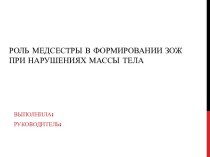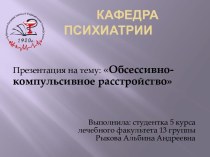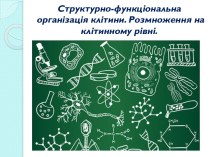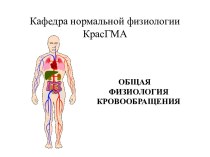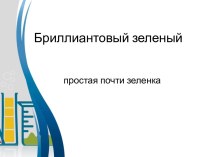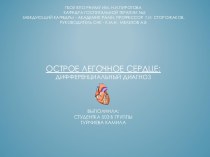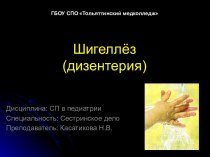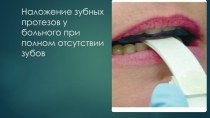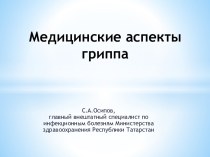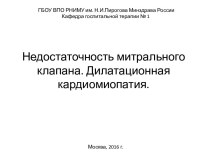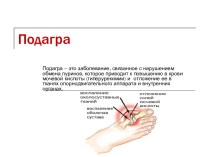- Главная
- Разное
- Бизнес и предпринимательство
- Образование
- Развлечения
- Государство
- Спорт
- Графика
- Культурология
- Еда и кулинария
- Лингвистика
- Религиоведение
- Черчение
- Физкультура
- ИЗО
- Психология
- Социология
- Английский язык
- Астрономия
- Алгебра
- Биология
- География
- Геометрия
- Детские презентации
- Информатика
- История
- Литература
- Маркетинг
- Математика
- Медицина
- Менеджмент
- Музыка
- МХК
- Немецкий язык
- ОБЖ
- Обществознание
- Окружающий мир
- Педагогика
- Русский язык
- Технология
- Физика
- Философия
- Химия
- Шаблоны, картинки для презентаций
- Экология
- Экономика
- Юриспруденция
Что такое findslide.org?
FindSlide.org - это сайт презентаций, докладов, шаблонов в формате PowerPoint.
Обратная связь
Email: Нажмите что бы посмотреть
Презентация на тему The bioethical basis of the doctor’s activity. Bioethics of biotechnologies
Содержание
- 2. Professional ethics - the ethical norms, values,
- 3. One of the earliest examples of professional
- 4. The professional additional moral responsibilitiescapable
- 5. Disciplinary codes Disciplinary codes allow the profession to draw a standard of conduct.
- 6. Professional responsibility encompasses:the duties of doctors to
- 7. Professional responsibility violations in general include:
- 8. Referral Fee splitting and the payments
- 9. Relationships with PatientsMost ethical codes forbid doctors
- 10. Declaration of HelsinkiIn 1964, the World Medical
- 11. BIOETHICS IN BIOTECHNOLOGY
- 12. For example, treatment with botulinum toxin (Botox)
- 13. Most inhabitants of Third World nations cannot
- 14. Bioterrorism and germ warfareThe anthrax attacks of
- 15. Whether or not research on germ warfare
- 16. Organ Donation 1 donor can save or
- 17. Organ replacement, artificial parts, and the Bionic
- 18. Organs are distributed on a first-come-first-served basis
- 19. Antibiotics When bacteria are exposed to antibiotics,
- 20. Another problem is that antibiotic treatment is
- 21. Transgenic Crop plantsThere are 3 main issues
- 22. Loss of BiodiversityHumans have been replacing diverse
- 23. Our planet’s biodiversity is under threat from human agriculture.
- 24. Animal TestingA generation ago, social activists demanded
- 25. What is Genetic Engineering? Scientific alterations in
- 26. Transgenic Animals and Animal CloningGenetic manipulations could
- 27. Cloning Cloning is the processes used to
- 28. Why clone humans? Creating replacement tissue (spare
- 29. Moral and Legal Issues of Cloning Do
- 30. Furthermore, environmental and developmental influences would mean
- 31. Altering the human germlineSoon it will become
- 32. Genetic Testing Genetic tests are tests on
- 33. Genetic Testing In some cases, there is
- 34. Stem CellsThere are two main types of
- 35. Stem Cell ResearchStem cells are the precursors
- 36. Stem cell research merges into other areas
- 37. Current IVF embryo policyLeft-over embryosIVF procedure generates
- 38. Current IVF embryo policyWhat is an IVF
- 39. Current IVF embryo policyWhich is ethically “better”?
- 40. What diseases do we do stem cell
- 41. Common concerns in funding decisionsNumber of people
- 42. Stem cell research merges into other areas
- 43. Privacy and Personal Genetic InformationIt may become
- 44. Conflict of science with traditional religionModern advances
- 45. Health FraudYou have probably seen ads for
- 46. Premature babiesAs science gets better and better,
- 47. AbortionWhether or not it is moral, should
- 48. Скачать презентацию
- 49. Похожие презентации
Professional ethics - the ethical norms, values, and principles that guide a profession and the ethics of decisions made within the profession
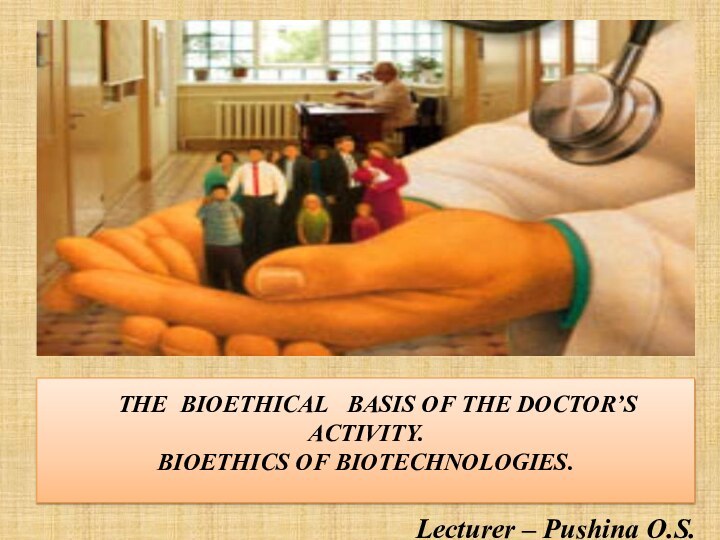
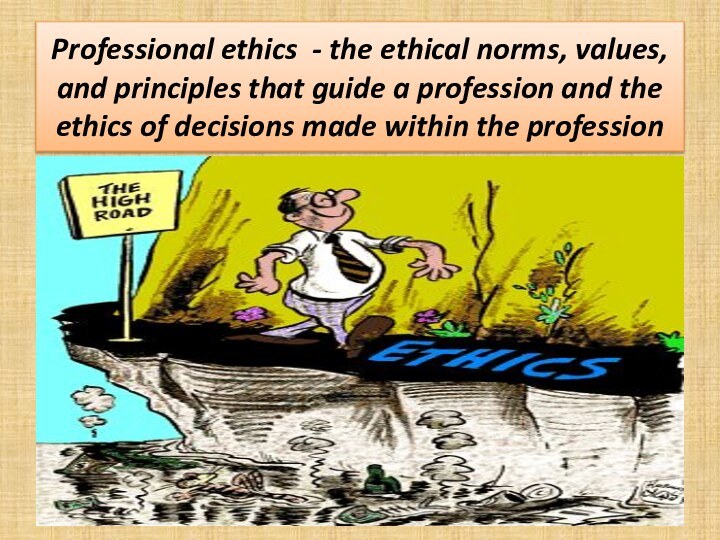
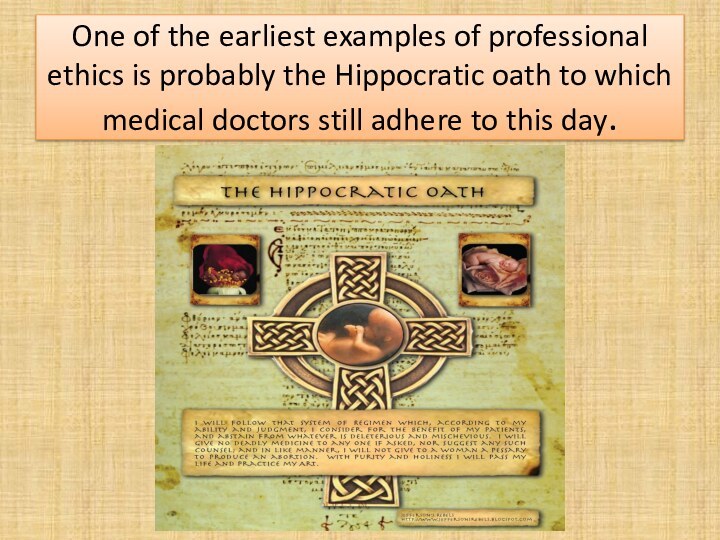
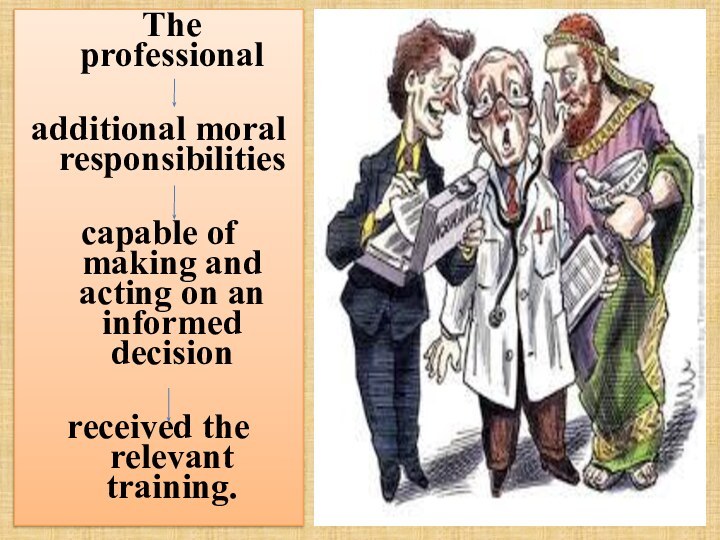
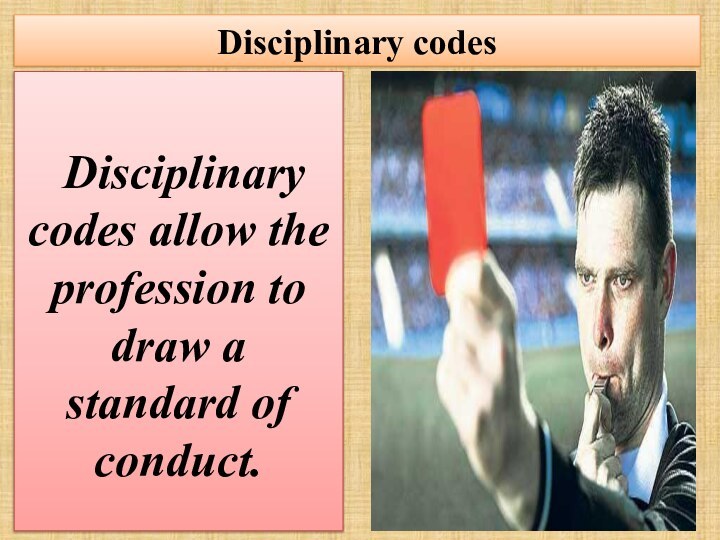
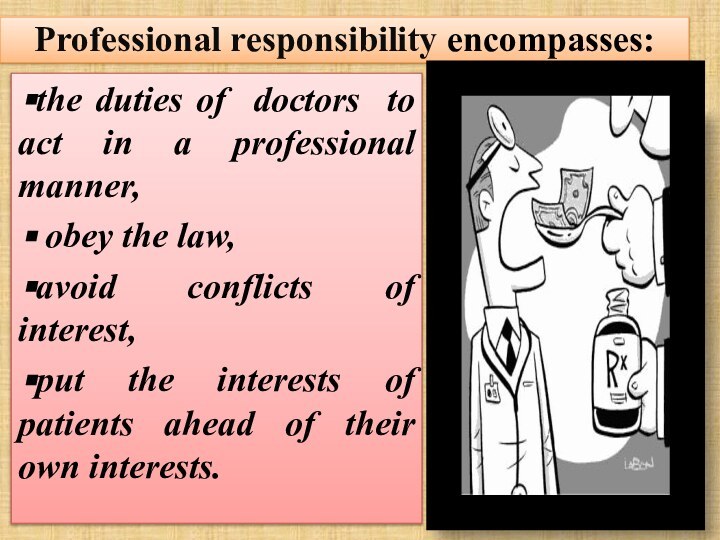
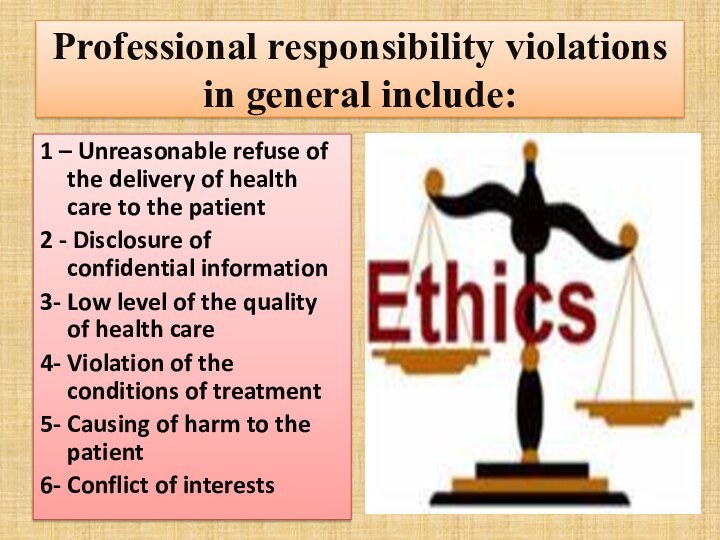
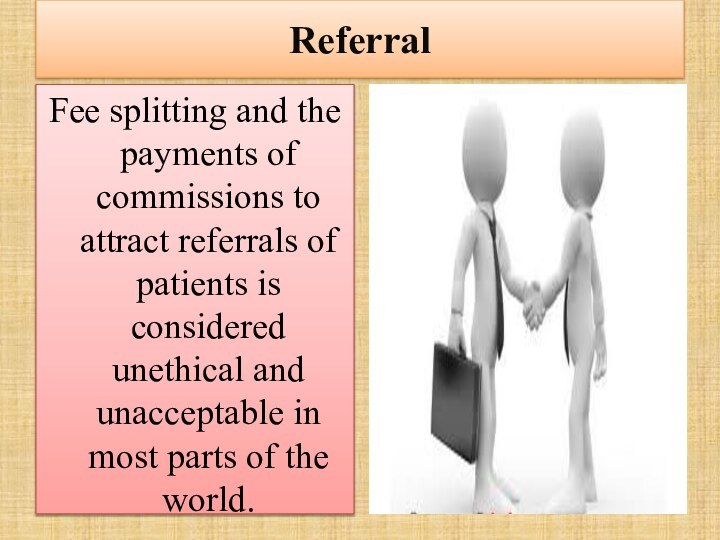
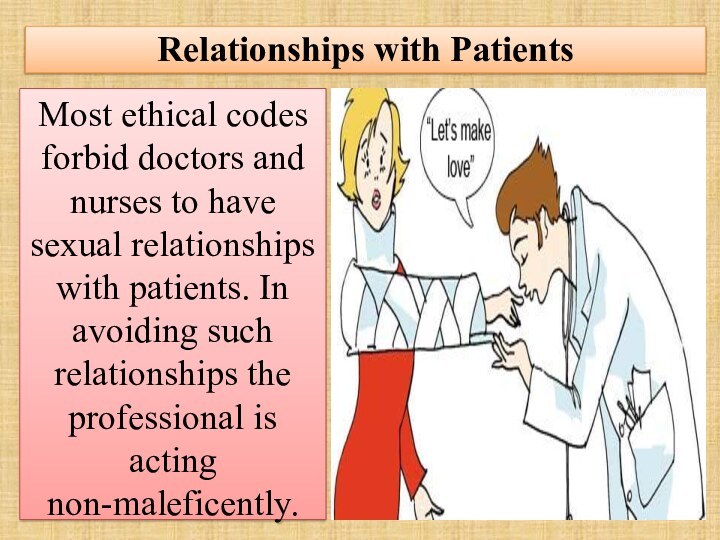
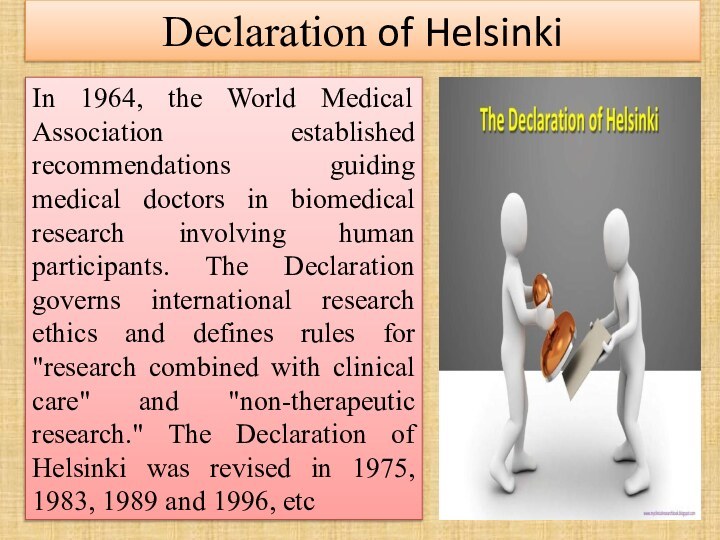
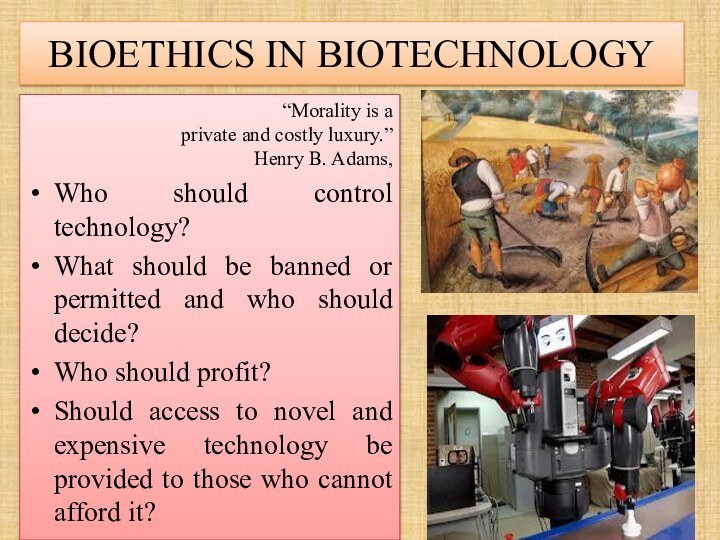
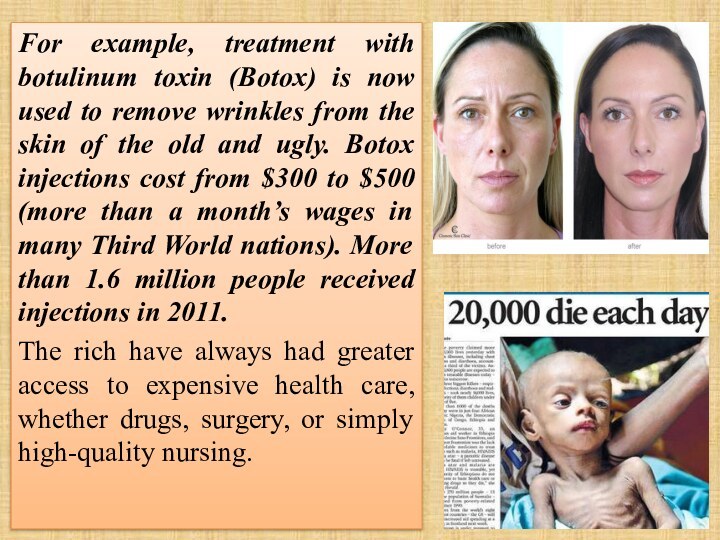
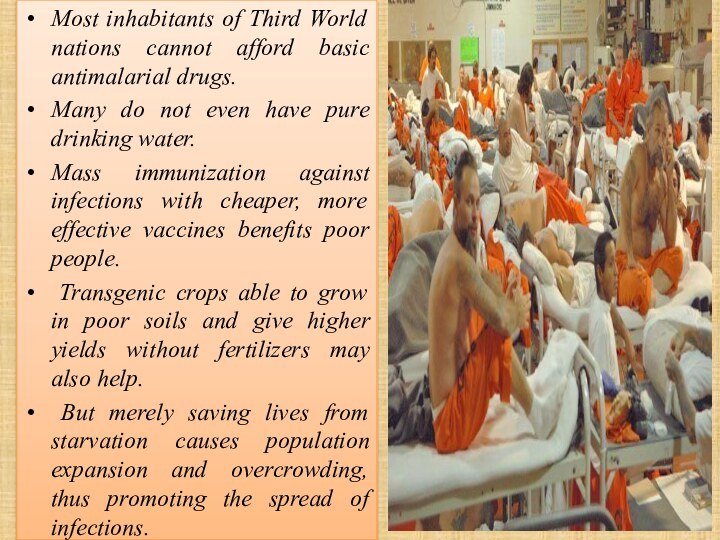


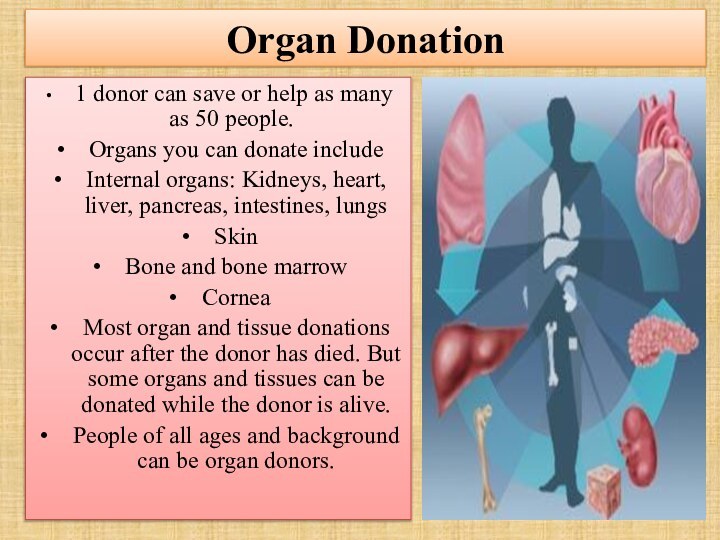
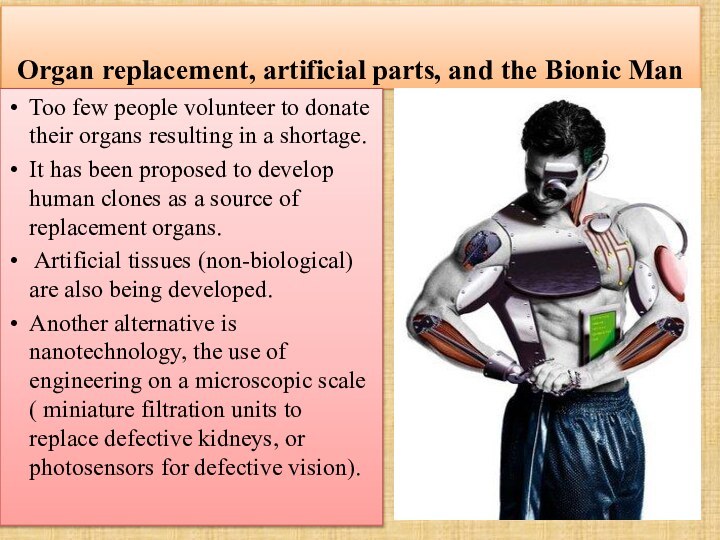
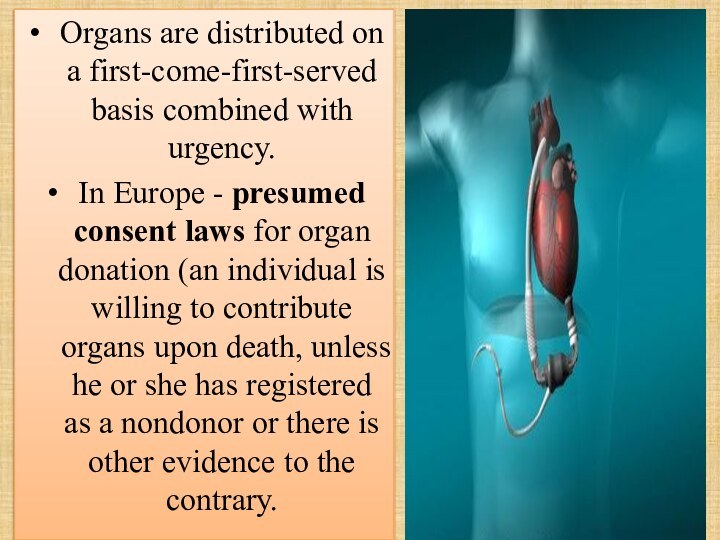
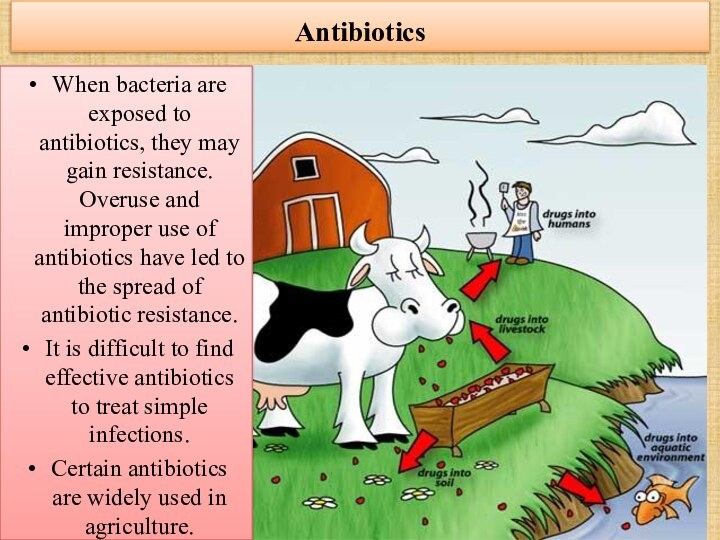
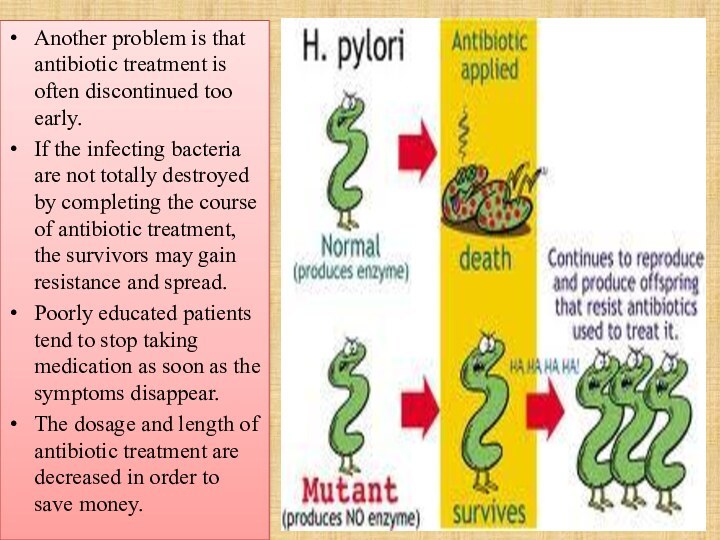
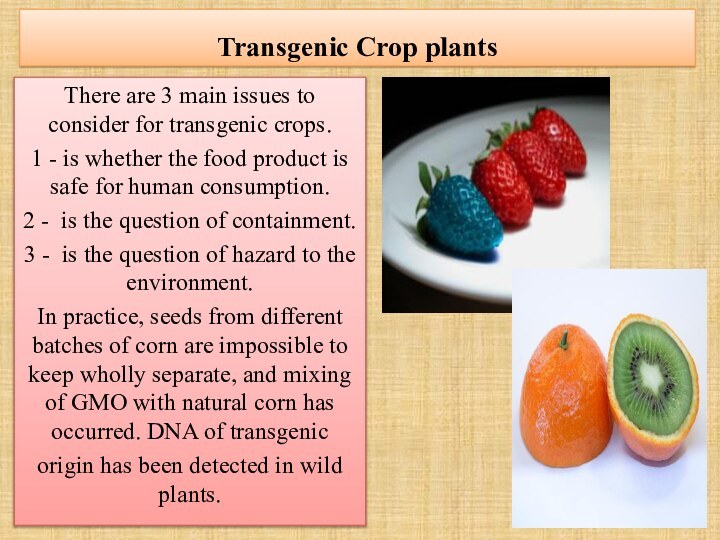
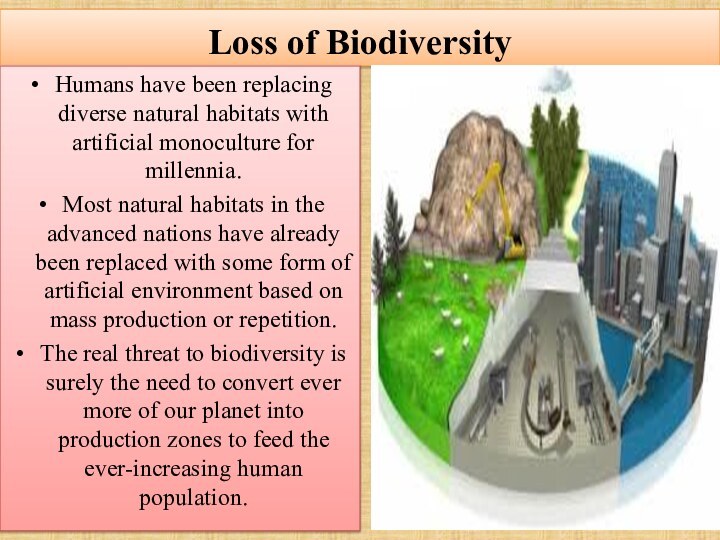
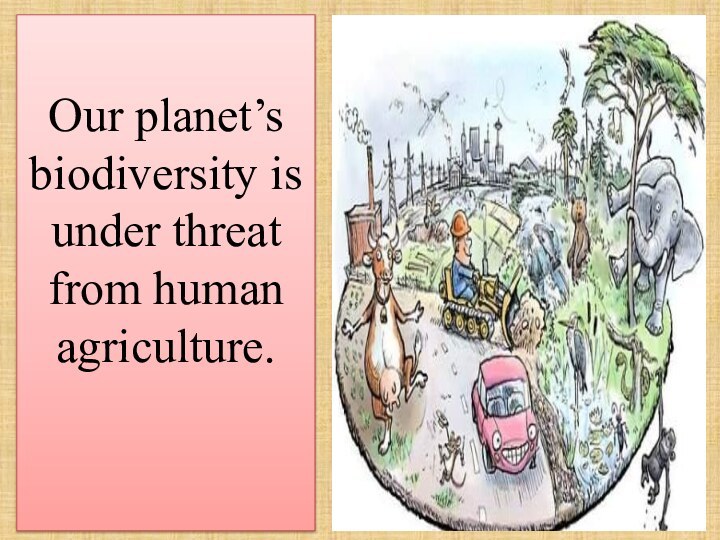
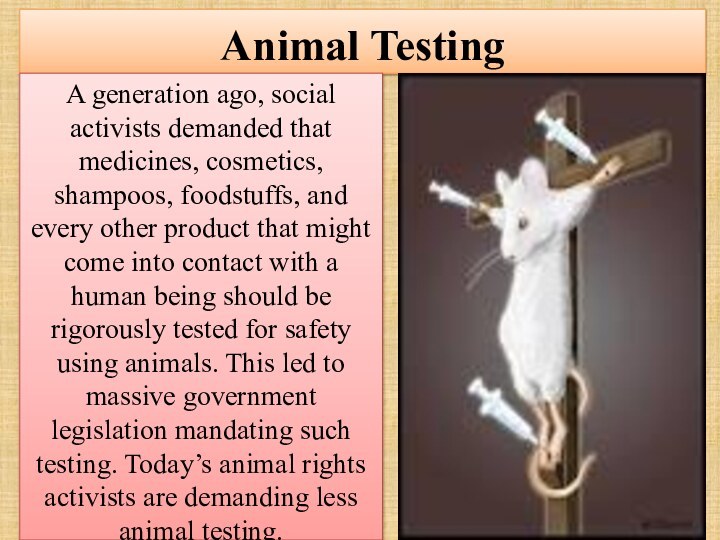
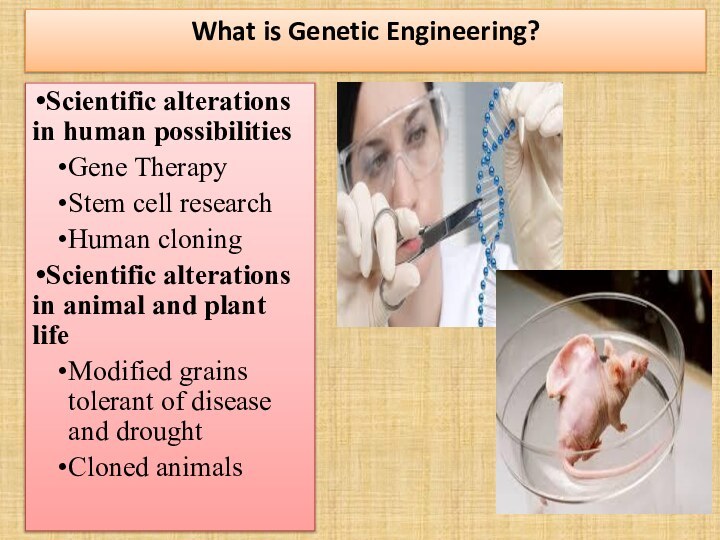
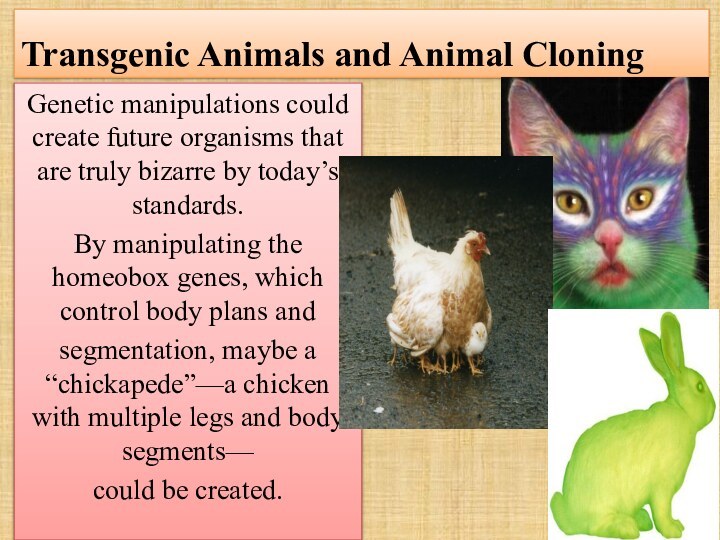
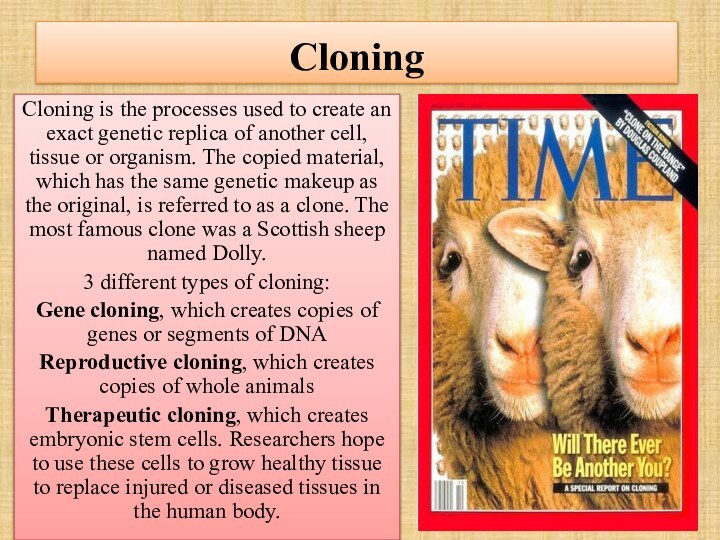
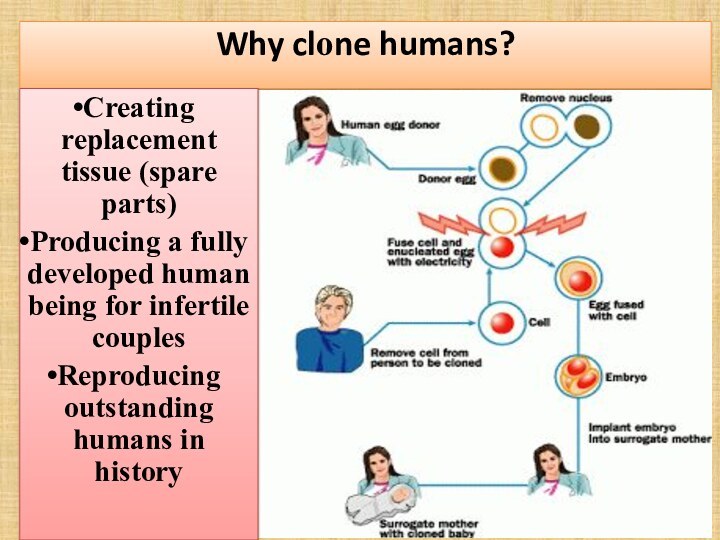
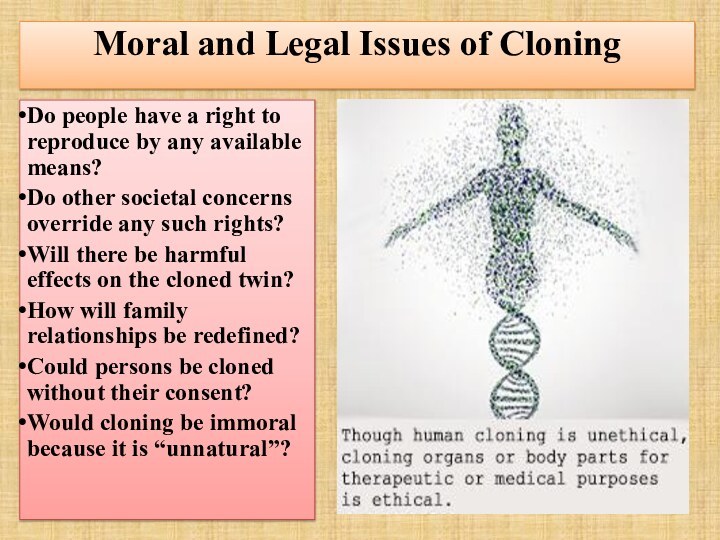
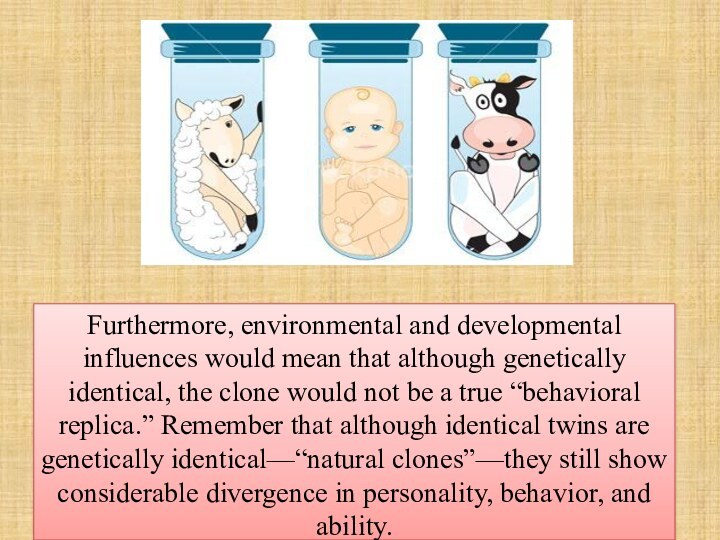
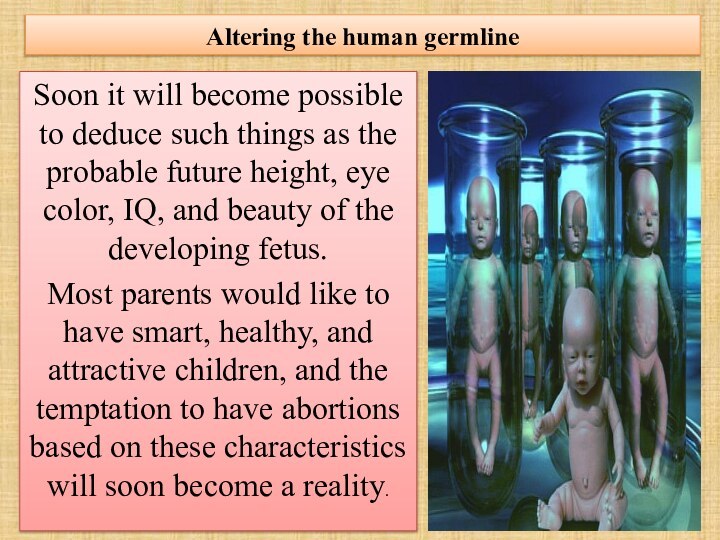
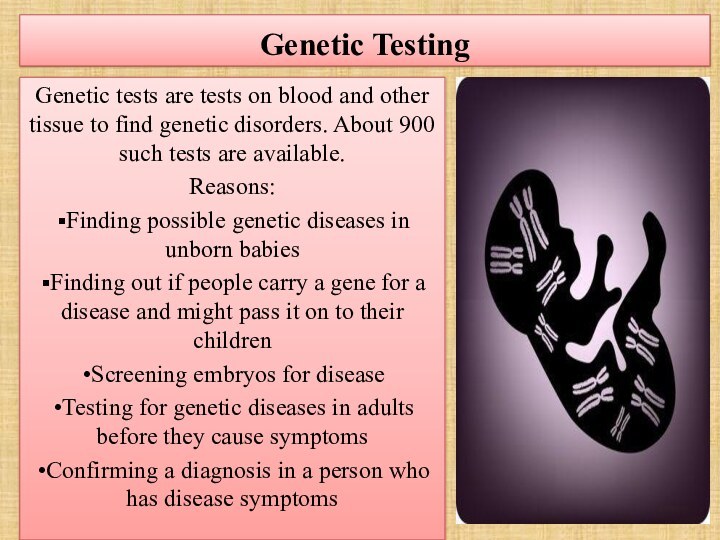
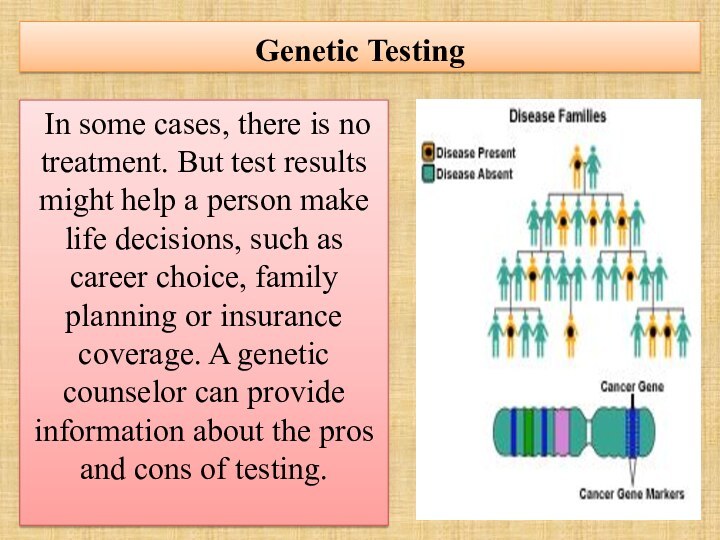
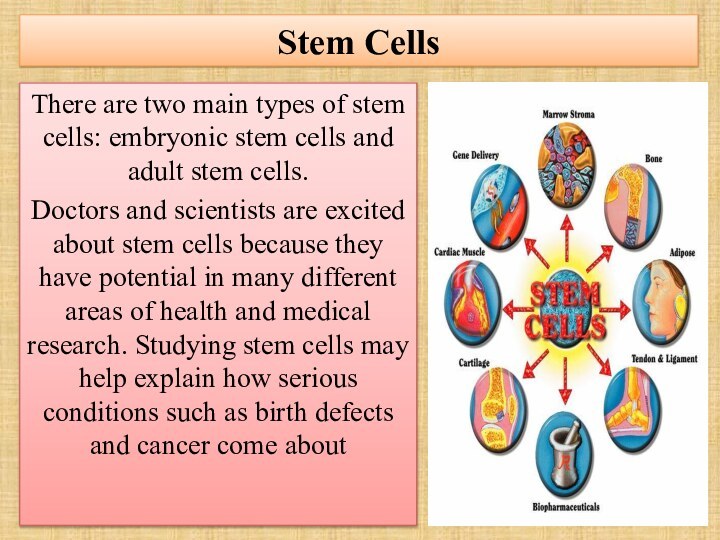
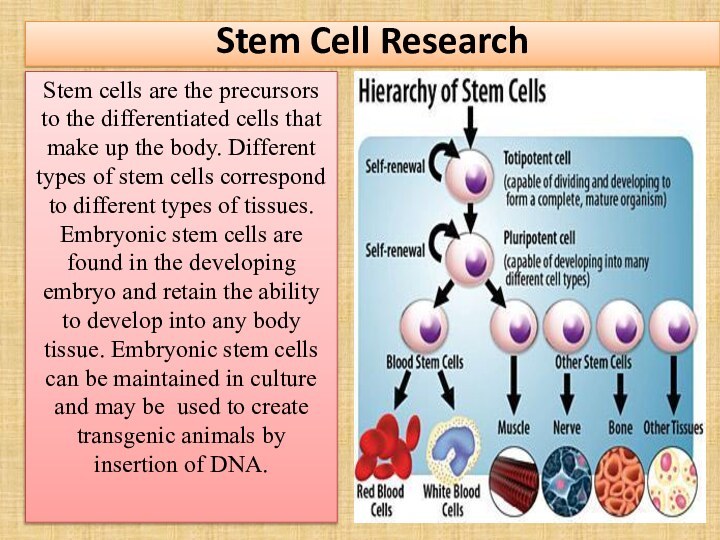
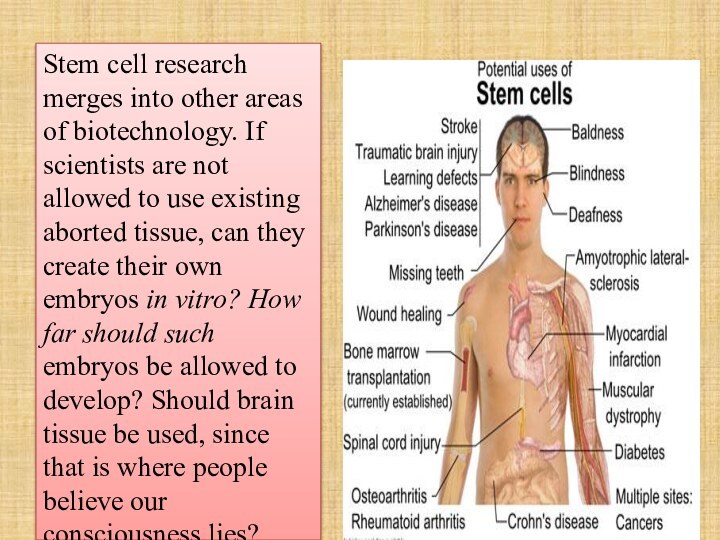
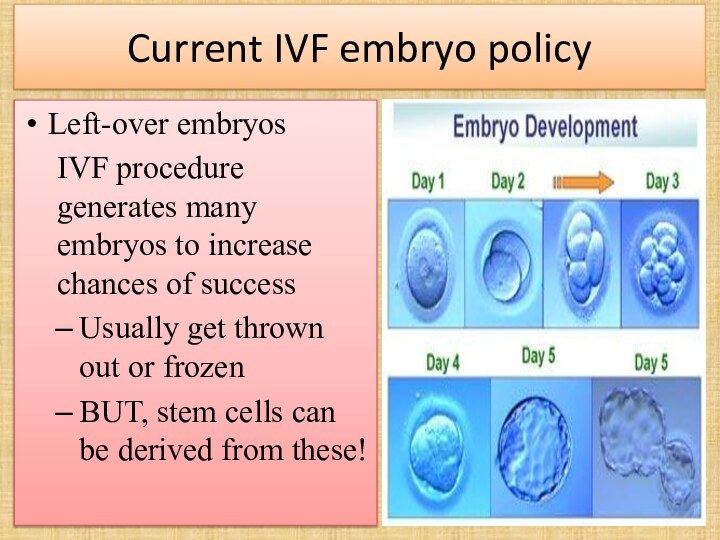
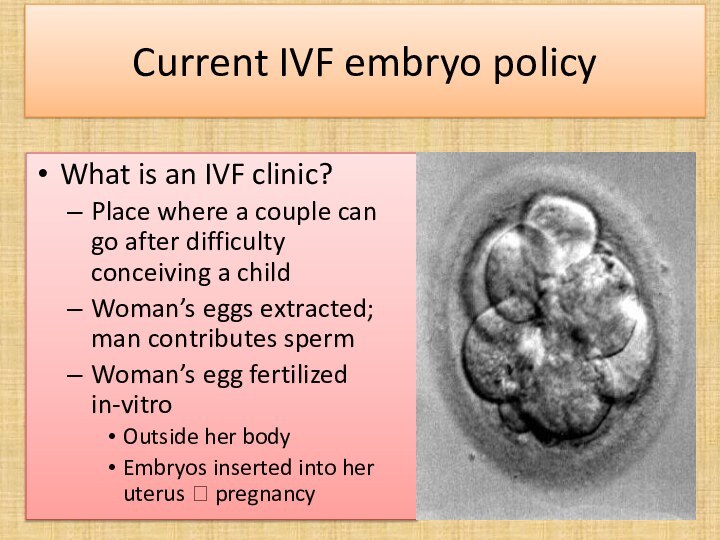
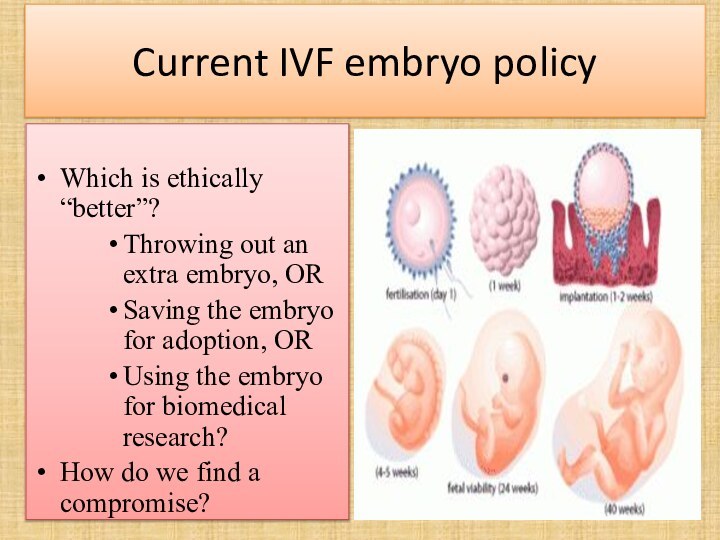
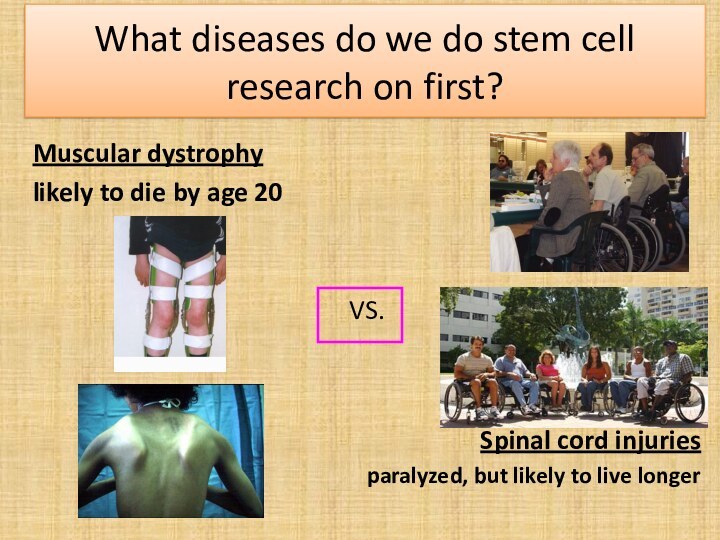
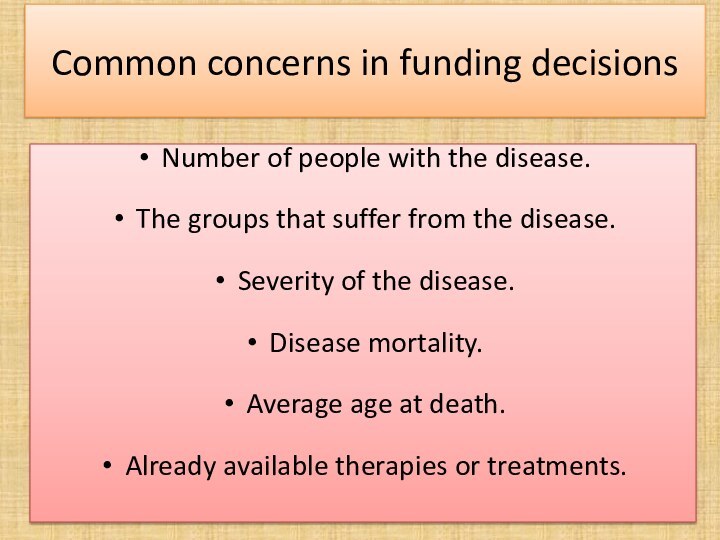
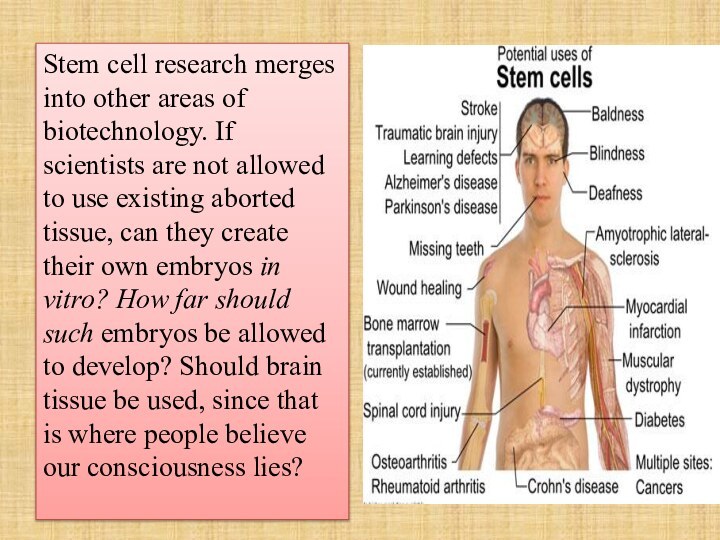
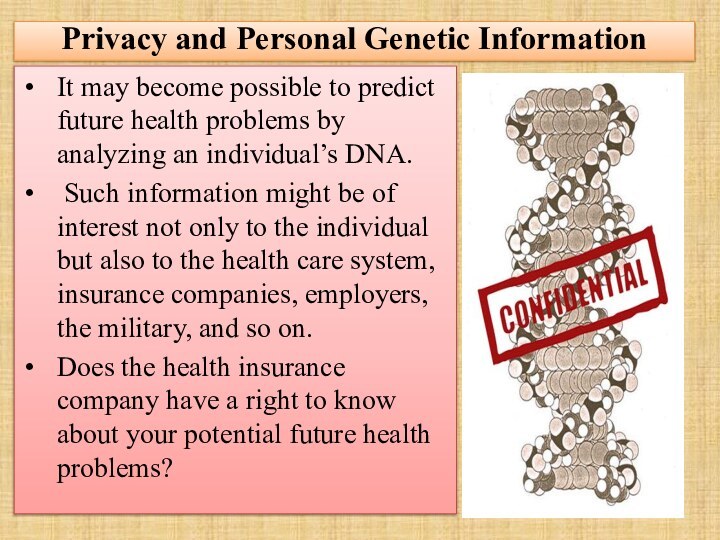
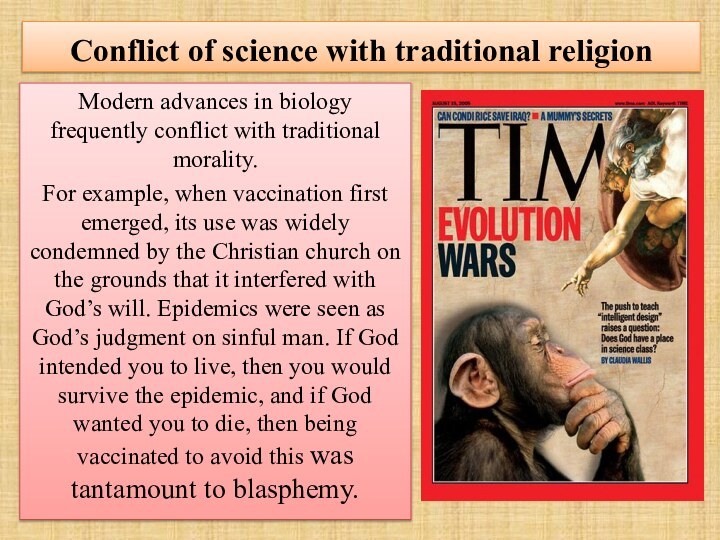
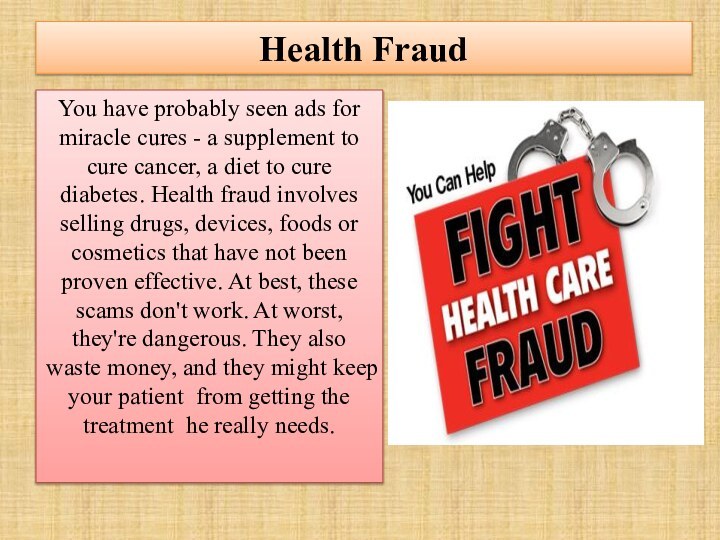
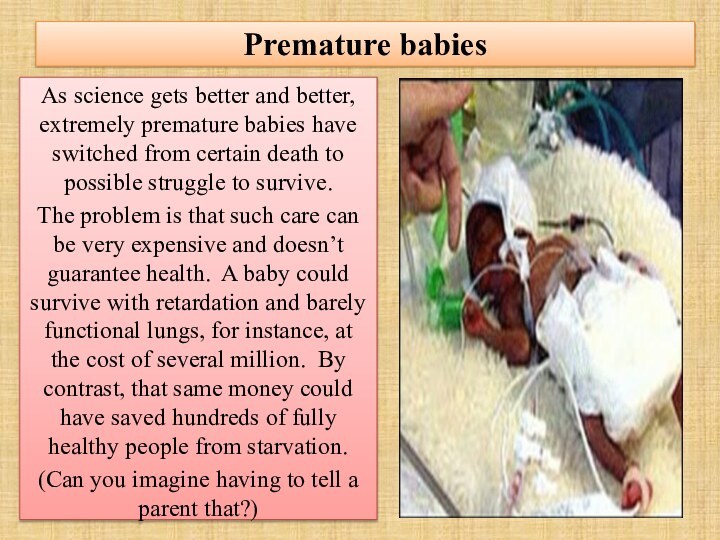
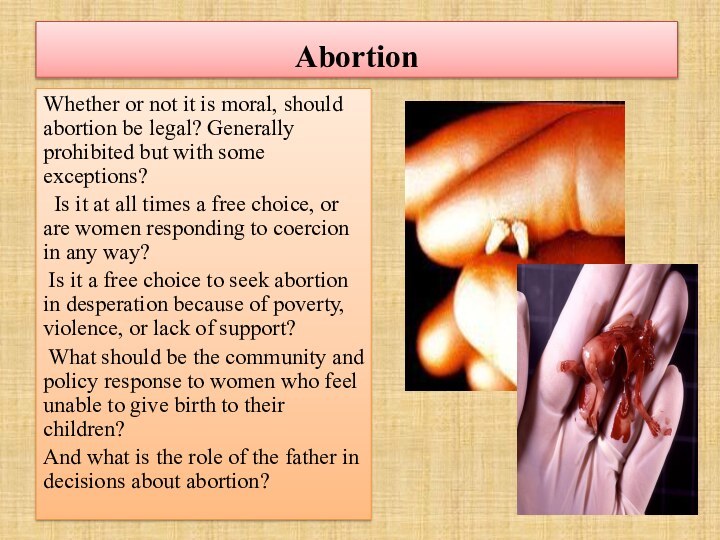

Слайд 3 One of the earliest examples of professional ethics
is probably the Hippocratic oath to which medical doctors
still adhere to this day.
Слайд 4
The professional
additional moral responsibilities
capable of
making and acting on an informed decision
received the
relevant training.
Слайд 6
Professional responsibility encompasses:
the duties of doctors to act
in a professional manner,
obey the law,
avoid conflicts
of interest, put the interests of patients ahead of their own interests.
Слайд 7
Professional responsibility violations in general include:
1 – Unreasonable
refuse of the delivery of health care to the
patient2 - Disclosure of confidential information
3- Low level of the quality of health care
4- Violation of the conditions of treatment
5- Causing of harm to the patient
6- Conflict of interests
Слайд 8
Referral
Fee splitting and the payments of commissions to
attract referrals of patients is considered unethical and unacceptable
in most parts of the world.
Слайд 9
Relationships with Patients
Most ethical codes forbid doctors and
nurses to have sexual relationships with patients. In avoiding
such relationships the professional is acting non-maleficently.
Слайд 10
Declaration of Helsinki
In 1964, the World Medical Association
established recommendations guiding medical doctors in biomedical research involving
human participants. The Declaration governs international research ethics and defines rules for "research combined with clinical care" and "non-therapeutic research." The Declaration of Helsinki was revised in 1975, 1983, 1989 and 1996, etc
Слайд 11
BIOETHICS IN BIOTECHNOLOGY
“Morality is a private and costly luxury.” Henry B. Adams,
Who should control technology?
What should be banned or permitted and who should decide?
Who should profit?
Should access to novel and expensive technology be provided to those who cannot afford it?
Слайд 12 For example, treatment with botulinum toxin (Botox) is
now used to remove wrinkles from the skin of
the old and ugly. Botox injections cost from $300 to $500 (more than a month’s wages in many Third World nations). More than 1.6 million people received injections in 2011.The rich have always had greater access to expensive health care, whether drugs, surgery, or simply high-quality nursing.
Слайд 13 Most inhabitants of Third World nations cannot afford
basic antimalarial drugs.
Many do not even have pure
drinking water. Mass immunization against infections with cheaper, more effective vaccines benefits poor people.
Transgenic crops able to grow in poor soils and give higher yields without fertilizers may also help.
But merely saving lives from starvation causes population expansion and overcrowding, thus promoting the spread of infections.
Слайд 14
Bioterrorism and germ warfare
The anthrax attacks of 2001–2002
that followed the terrorist destruction of the World Trade
Center in United States .The actual number of casualties was low, yet the associated fear was widespread and became a hot media topic.
Guns and bombs are highly visible.
Infectious microbial agents are invisible to the naked eye. ]
Слайд 15 Whether or not research on germ warfare should
be done is hotly debated.
Germ warfare has been
described as the “poor man’s nuclear weapon.”Nations too poor to develop costly high-tech weapons could throw together crude biological weapons relatively easily and cheaply.
Germ warfare thus represents a possible means by which Third World nations could protect themselves against the rich nations invader.
Слайд 16
Organ Donation
1 donor can save or
help as many as 50 people.
Organs you can
donate includeInternal organs: Kidneys, heart, liver, pancreas, intestines, lungs
Skin
Bone and bone marrow
Cornea
Most organ and tissue donations occur after the donor has died. But some organs and tissues can be donated while the donor is alive.
People of all ages and background can be organ donors.
Слайд 17
Organ replacement, artificial parts, and the Bionic Man
Too
few people volunteer to donate their organs resulting in
a shortage.It has been proposed to develop human clones as a source of replacement organs.
Artificial tissues (non-biological) are also being developed.
Another alternative is nanotechnology, the use of engineering on a microscopic scale ( miniature filtration units to replace defective kidneys, or photosensors for defective vision).
Слайд 18 Organs are distributed on a first-come-first-served basis combined
with urgency.
In Europe - presumed consent laws for
organ donation (an individual is willing to contribute organs upon death, unless he or she has registered as a nondonor or there is other evidence to the contrary.
Слайд 19
Antibiotics
When bacteria are exposed to antibiotics, they
may gain resistance. Overuse and improper use of antibiotics
have led to the spread of antibiotic resistance.It is difficult to find effective antibiotics to treat simple infections.
Certain antibiotics are widely used in agriculture.
Слайд 20 Another problem is that antibiotic treatment is often
discontinued too early.
If the infecting bacteria are not
totally destroyed by completing the course of antibiotic treatment, the survivors may gain resistance and spread. Poorly educated patients tend to stop taking medication as soon as the symptoms disappear.
The dosage and length of antibiotic treatment are decreased in order to save money.
Слайд 21
Transgenic Crop plants
There are 3 main issues to
consider for transgenic crops.
1 - is whether the
food product is safe for human consumption. 2 - is the question of containment.
3 - is the question of hazard to the environment.
In practice, seeds from different batches of corn are impossible to keep wholly separate, and mixing of GMO with natural corn has occurred. DNA of transgenic
origin has been detected in wild plants.
Слайд 22
Loss of Biodiversity
Humans have been replacing diverse natural
habitats with artificial monoculture for millennia.
Most natural habitats
in the advanced nations have already been replaced with some form of artificial environment based on mass production or repetition.The real threat to biodiversity is surely the need to convert ever more of our planet into production zones to feed the ever-increasing human population.
Слайд 24
Animal Testing
A generation ago, social activists demanded that
medicines, cosmetics, shampoos, foodstuffs, and every other product that
might come into contact with a human being should be rigorously tested for safety using animals. This led to massive government legislation mandating such testing. Today’s animal rights activists are demanding less animal testing.
Слайд 25
What is Genetic Engineering?
Scientific alterations in human possibilities
Gene
Therapy
Stem cell research
Human cloning
Scientific alterations in animal and plant
lifeModified grains tolerant of disease and drought
Cloned animals
Слайд 26
Transgenic Animals and Animal Cloning
Genetic manipulations could create
future organisms that are truly bizarre by today’s standards.
By manipulating the homeobox genes, which сontrol body plans and
segmentation, maybe a “chickapede”—a chicken with multiple legs and body segments—
could be created.
Слайд 27
Cloning
Cloning is the processes used to create
an exact genetic replica of another cell, tissue or
organism. The copied material, which has the same genetic makeup as the original, is referred to as a clone. The most famous clone was a Scottish sheep named Dolly.3 different types of cloning:
Gene cloning, which creates copies of genes or segments of DNA
Reproductive cloning, which creates copies of whole animals
Therapeutic cloning, which creates embryonic stem cells. Researchers hope to use these cells to grow healthy tissue to replace injured or diseased tissues in the human body.
Слайд 28
Why clone humans?
Creating replacement tissue (spare parts)
Producing a
fully developed human being for infertile couples
Reproducing outstanding humans
in history
Слайд 29
Moral and Legal Issues of Cloning
Do people have
a right to reproduce by any available means?
Do other
societal concerns override any such rights?Will there be harmful effects on the cloned twin?
How will family relationships be redefined?
Could persons be cloned without their consent?
Would cloning be immoral because it is “unnatural”?
Слайд 30 Furthermore, environmental and developmental influences would mean that
although genetically identical, the clone would not be a
true “behavioral replica.” Remember that although identical twins are genetically identical—“natural clones”—they still show considerable divergence in personality, behavior, and ability.
Слайд 31
Altering the human germline
Soon it will become possible
to deduce such things as the probable future height,
eye color, IQ, and beauty of the developing fetus.Most parents would like to have smart, healthy, and attractive children, and the temptation to have abortions based on these characteristics will soon become a reality.
Слайд 32
Genetic Testing
Genetic tests are tests on blood
and other tissue to find genetic disorders. About 900
such tests are available.Reasons:
Finding possible genetic diseases in unborn babies
Finding out if people carry a gene for a disease and might pass it on to their children
Screening embryos for disease
Testing for genetic diseases in adults before they cause symptoms
Confirming a diagnosis in a person who has disease symptoms
Слайд 33
Genetic Testing
In some cases, there is
no treatment. But test results might help a person
make life decisions, such as career choice, family planning or insurance coverage. A genetic counselor can provide information about the pros and cons of testing.
Слайд 34
Stem Cells
There are two main types of stem
cells: embryonic stem cells and adult stem cells.
Doctors
and scientists are excited about stem cells because they have potential in many different areas of health and medical research. Studying stem cells may help explain how serious conditions such as birth defects and cancer come about
Слайд 35
Stem Cell Research
Stem cells are the precursors to
the differentiated cells that make up the body. Different
types of stem cells correspond to different types of tissues. Embryonic stem cells are found in the developing embryo and retain the ability to develop into any body tissue. Embryonic stem cells can be maintained in culture and may be used to create transgenic animals by insertion of DNA.Слайд 36 Stem cell research merges into other areas of
biotechnology. If scientists are not allowed to use existing
aborted tissue, can they create their own embryos in vitro? How far should such embryos be allowed to develop? Should brain tissue be used, since that is where people believe our consciousness lies?
Слайд 37
Current IVF embryo policy
Left-over embryos
IVF procedure generates many
embryos to increase chances of success
Usually get thrown
out or frozenBUT, stem cells can be derived from these!
Слайд 38
Current IVF embryo policy
What is an IVF clinic?
Place
where a couple can go after difficulty conceiving a
childWoman’s eggs extracted; man contributes sperm
Woman’s egg fertilized in-vitro
Outside her body
Embryos inserted into her uterus ? pregnancy
Слайд 39
Current IVF embryo policy
Which is ethically “better”?
Throwing
out an extra embryo, OR
Saving the embryo for adoption,
ORUsing the embryo for biomedical research?
How do we find a compromise?
Слайд 40 What diseases do we do stem cell research
on first?
Muscular dystrophy
likely to die by age 20
VS.
Spinal cord
injuriesparalyzed, but likely to live longer
Слайд 41
Common concerns in funding decisions
Number of people with
the disease.
The groups that suffer from the disease.
Severity of the disease.
Disease mortality.
Average age at death.
Already available therapies or treatments.
Слайд 42 Stem cell research merges into other areas of
biotechnology. If scientists are not allowed to use existing
aborted tissue, can they create their own embryos in vitro? How far should such embryos be allowed to develop? Should brain tissue be used, since that is where people believe our consciousness lies?
Слайд 43
Privacy and Personal Genetic Information
It may become possible
to predict future health problems by analyzing an individual’s
DNA.Such information might be of interest not only to the individual but also to the health care system, insurance companies, employers, the military, and so on.
Does the health insurance company have a right to know about your potential future health problems?
Слайд 44
Conflict of science with traditional religion
Modern advances in
biology frequently conflict with traditional morality.
For example, when
vaccination first emerged, its use was widely condemned by the Christian church on the grounds that it interfered with God’s will. Epidemics were seen as God’s judgment on sinful man. If God intended you to live, then you would survive the epidemic, and if God wanted you to die, then being vaccinated to avoid this was tantamount to blasphemy.
Слайд 45
Health Fraud
You have probably seen ads for miracle
cures - a supplement to cure cancer, a diet
to cure diabetes. Health fraud involves selling drugs, devices, foods or cosmetics that have not been proven effective. At best, these scams don't work. At worst, they're dangerous. They also waste money, and they might keep your patient from getting the treatment he really needs.
Слайд 46
Premature babies
As science gets better and better, extremely
premature babies have switched from certain death to possible
struggle to survive.The problem is that such care can be very expensive and doesn’t guarantee health. A baby could survive with retardation and barely functional lungs, for instance, at the cost of several million. By contrast, that same money could have saved hundreds of fully healthy people from starvation.
(Can you imagine having to tell a parent that?)
Слайд 47
Abortion
Whether or not it is moral, should abortion
be legal? Generally prohibited but with some exceptions?
Is it at all times a free choice, or are women responding to coercion in any way? Is it a free choice to seek abortion in desperation because of poverty, violence, or lack of support?
What should be the community and policy response to women who feel unable to give birth to their children?
And what is the role of the father in decisions about abortion?
